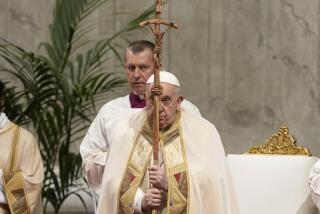Vatican, Israel Agree to Full Ties : Religion: The historic accord will be signed today, ushering in a new alliance between Christians and Jews. Ambassador exchange and papal visit are expected soon.
- Share via
VATICAN CITY — Negotiators for the Vatican and the State of Israel on Wednesday ratified a landmark agreement to establish full diplomatic relations, heralding a new era in the often contentious 2,000-year-long dialogue between Christians and Jews.
Papal spokesman Joaquin Navarro called the accord a “historic opening” that will enable the Holy See to play a greater role in the Middle East peace process.
Israeli Ambassador to Rome Avi Pazner told The Times that “beyond the historic agreement to open relations between the Vatican and Israel, there is also a Jewish and Catholic dimension after 2,000 years in which there have been more downs than ups.”
Seen from history’s perspective, the agreement is a breathtaking new direction: It was only in 1965 that the Second Vatican Council repudiated the concept of collective Jewish guilt for the death of Christ.
The 15-article agreement, which will be signed in Jerusalem today, provides for the immediate exchange of diplomatic representatives and the appointment of ambassadors in another few months, after final ratification by the Israeli Parliament.
An early fruit of the agreement is likely to be Pope John Paul II’s acceptance of a longstanding Israeli invitation to visit the Holy Land.
“The Pope was instrumental in turning a new page to normalization,” said Pazner, one of nine Israeli negotiators. “Now a papal trip is only a question of time. I think it will come in 1994.”
In the Fundamental Agreement, Israel guarantees the free exercise of Catholic worship, institutions and education, supports Christian pilgrimages to the Holy Land and promises continued free access to Christian religious sites.
The church may administer its own communications media and welfare agencies, consistent with Israeli civil law.
The Holy See and Israel jointly condemn anti-Semitism, proclaiming themselves “committed to appropriate cooperation in combatting all forms of anti-Semitism and all kinds of racism and of religious intolerance, and in promoting mutual understanding among nations, tolerance among communities and respect for human life.”
The Vatican, for its part, reiterates “its condemnation of hatred, persecution and all other manifestations of anti-Semitism.”
The Vatican, which has long sought to balance Israeli demands for diplomatic ties against its quest to protect Catholic minorities in Arab countries, is careful to note in the agreement that “it is solemnly committed to remaining a stranger to all merely temporal conflicts, which principle applies specifically to disputed territories and unsettled borders.”
Most Christians under Israeli rule are West Bank Arabs. Like nearly all of Israel’s diplomatic partners, the Holy See does not accept Jerusalem as the Israeli capital. The papal nuncio will live in Tel Aviv.
“I can’t think of a more positive way of beginning the new year than with this document of Catholic-Jewish reconciliation throughout the world,” said Raymond Flynn, U.S. ambassador to the Vatican, on Wednesday.
The accord to be signed today by Msgr. Claudio Celli, the Vatican’s undersecretary for foreign relations, and Yossi Beilin, Israel’s deputy foreign minister, leaves a number of key church-state issues to subsequent negotiations.
Among them is the tax and legal status of the church and its institutions in Israel and the occupied territories.
The Vatican has long recognized the right of Israel to exist within secure borders. But it steadfastly resisted pressure from Israel and international Jewish groups to establish relations without progress on the Palestinian question and the status of Jerusalem.
The Vatican has sought international control for the city, with its Jewish, Christian and Muslim faiths.
With these wider issues suddenly on the agenda of Palestinian-Israeli peace talks, Vatican-Israeli negotiations, which opened on July 29, 1992, focused on bilateral issues and acquired momentum.
Dialogue between Catholics and Jews has developed dramatically during the 15-year reign of John Paul II.
In 1986, the Pope paid a historic visit to the main synagogue in Rome, praying with the chief rabbi inside what for four centuries had been a locked-at-night Jewish ghetto by papal decree.
No stranger to anti-Semitism at home in Poland, John Paul has made emotional pilgrimages to World War II Nazi death camps in Poland and Austria.
More to Read
Sign up for Essential California
The most important California stories and recommendations in your inbox every morning.
You may occasionally receive promotional content from the Los Angeles Times.













